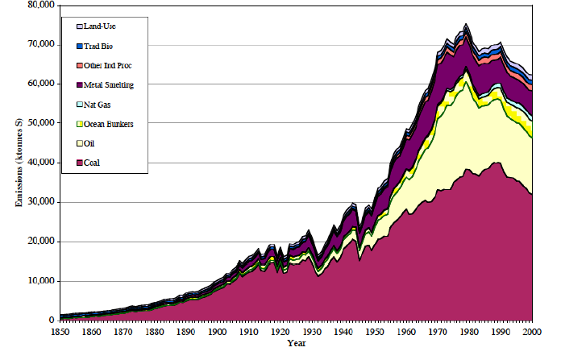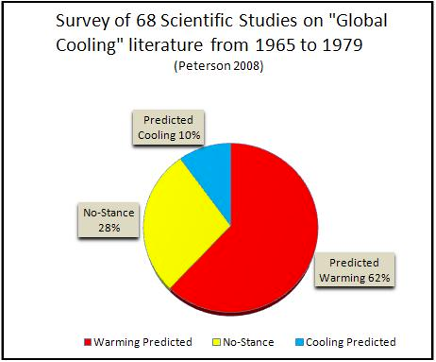What were climate scientists predicting in the 1970s?
What the science says...
| Select a level... |
 Basic
Basic
|
 Intermediate
Intermediate
| |||
|
1970s ice age predictions were predominantly media based. The majority of peer reviewed research at the time predicted warming due to increasing CO2. |
|||||
Ice age predicted in the 70s
"If you go back to Time Magazine, they actually were proclaiming the next ice age is coming, now it's become global warming… How do you believe the same people that were predicting just a couple decades ago that the new ice age is coming?" (Sean Hannity)
In the 1970s, climate scientists were investigating the effects of rising industrial emissions on Earth’s climate. These emissions have two main components that affect the climate system. One of these components is carbon dioxide (CO2), a greenhouse or heat-trapping gas, that causes overall increases in global temperatures. The other component is aerosols, small atmospheric particles that block incoming sunlight. This can have a cooling effect on the Earth’s overall temperature, but aerosols only stay in the atmosphere for about two weeks before being rained out. These two contrasting effects led climate scientists to two different conclusions regarding what might happen to Earth’s climate in the future.
The Case for Cooling
Studies that projected aerosol-related cooling, such as Rasool & Schneider (1971), said that “An increase by only a factor of 4 in global aerosol concentration may be sufficient to reduce surface temperature by as much as 3.5 K.” This speculation of quadrupling was based on the rapidly increasing concentration of aerosols like sulfur dioxide leading up to the 1970’s. However, with the adoption of policies like the Clean Air Act, aerosol emissions began to decrease in the late 1970’s. Figure 1 below, adapted from Smith et al. (2004), shows this decrease in aerosol emissions. Note the peak in the late 1970s and the downslope since approximately 1980:


Figure1: Aerosol emissions from 1850-2000. Different colors of the graph indicate different sources of aerosols.
The Case for Warming
The warming effect of CO2 has been known since 1856, when scientist Eunice Foote published a study indicating that increasing atmospheric CO2 would increase the Earth’s overall temperature. A large majority (62%) of climate studies from the 1970s concluded that this greenhouse warming by CO2 was the dominant force of industrial emissions. In fact, there were 6 times more studies predicting warming than there were predicting cooling Peterson et al. (2008).

Figure 2: Percentages of peer-reviewed climate studies from 1965-1979 that predicted warming, the percentage that predicted cooling, and the percentage that took no stance on whether warming or cooling would occur.
So, what did 1970’s Climate Science Actually Say?
Despite the majority of studies projecting warming, one common myth today misrepresents climate science in the 1970s by saying that the general understanding was of an imminent ice age. The small fraction of studies predicting cooling received a lot of media attention in the 1970s. The idea of a forthcoming ice age made for great headlines. The effect of this disproportionate media coverage persists today, as some people and organizations continue to perpetuate the idea that an ice age was predicted in the 1970s.
Those who continue to spread this idea create a straw man argument. A straw man is when an opponent’s position is misrepresented in order to make that position easier to attack. In this case, the position is the cooling prediction that was only held by a small minority of scientists, and has since been abandoned. This straw man results in the distortion of public understanding of climate science, and made it easier to cast doubt on the fact that our planet is currently warming due to human activity.
Increased Scientific Understanding
The majority of climate scientists predicted warming from CO2 emissions, and data supporting this prediction increased throughout the 1970s. Many lines of evidence continued to build up, all indicating rising temperatures. By about 1980, evidence for warming was so overwhelming that ice age predictions had stopped altogether. This increase in understanding based on new evidence is a key part of the scientific process. Scientific thinking evolves as studies reveal new information. In the case of global warming vs. impending ice age, climatologist Stephen Schneider is an example of this key component of science. He was the second author on the aforementioned Rasool (1971) paper, which asserted that a quadrupling of aerosols would decrease global temperatures and, if this decrease was sustained, might lead into an ice age. However, upon revisiting this conclusion in 1974, when data and climate models had advanced, Schneider retracted the findings:
“I personally published what was wrong (with) my own original 1971 cooling hypothesis a few years later when more data and better models came along and further analysis showed [anthropogenic global warming] as the much more likely…” (Schneider quoted in Santer & Erlich (2014))
The prediction of cooling was based on the notion that aerosols from human emissions would quadruple. This increase simply did not happen, thanks in large part to actions like the Clean Air Act. Aerosol emissions actually decreased in the late 1970s, as previously mentioned. Thus, the key aspect of the cooling prediction did not come to pass, and the prediction was abandoned.
Today, observed warming of Earth’s average temperature continues to verify the majority predictions of climate scientists in the 1970s. Aside from the dominant planetary effect of CO2, a big reason that aerosols currently have a minimal effect on the climate is that actions have been taken to reduce aerosol emissions. We have a chance to create the same effect with greenhouse gases – by transitioning to renewables like wind and solar as our main energy sources. In doing so, we can decrease CO2 emissions and help curb the effects of warming global temperatures.
This rebuttal was updated by Kyle Pressler in September 2021 to replace broken links. The updates are a result of our call for help published in May 2021.
Last updated on 13 November 2020 by morr6. View Archives































 Arguments
Arguments











































Climate Myth...